Hello and welcome,
We learned with great sadness yesterday that, William Cardinal Baum, the former Archbishop of the Archdiocese of Washington had passed away. In addition to his ministry in Washington, he had been the former Prefect of the Congregation for Catholic Education and the former Grand Penitentiary.
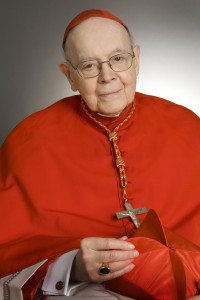
Cardinal Baum came to Washington in the 1970s, at a time when there was great conflict in the archdiocese and chose for his motto Ministerium reconciliationis, “The ministry of reconciliation”. His motto reflected his gentle and kind pastoral approach, which was a very important means of healing many divisions in the archdiocese.
At the time I was at the Centro Catolico and he was very supportive of Hispanic ministry, allowing us to organize and expand pastoral services to the newly arriving immigrants throughout the archdiocese. He was also very supportive of the Hispanic newspaper “El Pregonero,” the Hispanic diaconate program and many other initiatives that responded to what was really the beginning of an enormous wave of Catholic immigration into the Archdiocese of Washington.
For the last few years he had been living at the house of the Little Sisters of the Poor on Harewood Road in Washington, very near Catholic University. He was a very dear friend and I was always happy to see him.
In the last couple of years he’s been more limited in his mobility, but I would occasionally be able to visit him and he was always very engaged and interested in everything that was happening in the Church. He was a very cultured gentleman who was very much committed to the intellectual life of the Church and very much involved in ecumenical outreach to other churches.
Though there have been three archbishops in Washington since the time he left, he is still fondly remembered. His long years of ministry were characterized by his gentleness, kindliness, gentlemanliness and his concern for people. He will be sorely missed.
– – –
Earlier this week, in my role as the chairman of the USCCB’s Committee for Pro-Life Affairs, I issued a statement together with Archbishop Wenski, the chairman of the Committee on Domestic Justice and Human Development, calling for an end to the death penalty in our country.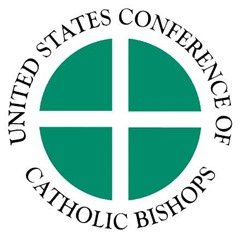
Since the time of St. John Paul II, the death penalty has been seen as one of the issues that needs to be addressed in our modern world, as part of our commitment to the Gospel of Life and to show how precious life is. The Catechism of the Catholic Church and the papal magisterium reflect this important idea.
There are very few countries in the modern world that still apply the death penalty. The only justification for the death penalty is self-defense and the inability of the country to provide any other type of solution. Here, in the wealthiest and most technologically advanced country in the history of the world, we have alternatives to capital punishment. Therefore, we have an obligation to abolish the death penalty and initiate alternatives.
I’d like to share the text of that statement with you here:
Ten years ago, the Catholic bishops of the United States initiated the Catholic Campaign to End the Use of the Death Penalty. Speaking as pastors and teachers, we issued a statement at that time, A Culture of Life and the Penalty of Death, in which we considered the reality of capital punishment in the United States. We urged a prudential examination of the use of the death penalty, with the aim of helping to build “a culture of life in which our nation will no longer try to teach that killing is wrong by killing those who kill. This cycle of violence diminishes all of us.”
Since that time, significant gains have been made. Several states, including New York, New Jersey, New Mexico, Illinois, Connecticut, Maryland and most recently Nebraska, have ended the use of the death penalty, and other states have enacted moratoria. Death sentences are at their lowest level since the reinstatement of the death penalty in 1976. However, there is still a great deal of work to be done, and we must recommit ourselves to end this practice in our country.
We join our Holy Father, Pope Francis, in anticipation of the forthcoming Jubilee Year of Mercy, and renew our efforts in calling for the end of the use of the death penalty:
“Today the death penalty is inadmissible, no matter how serious the crime committed. It is an offense against the inviolability of life and the dignity of the human person, one which contradicts God’s plan for man and society and his merciful justice, and impedes the penalty from fulfilling any just objective. It does not render justice to the victims, but rather fosters vengeance.”
– Pope Francis, March 20, 2015
Our faith tradition offers a unique perspective on crime and punishment, one grounded in mercy and healing, not punishment for its own sake. No matter how heinous the crime, if society can protect itself without ending a human life, it should do so. Today, we have this capability.
We are all sinners, but through the Father’s loving mercy and Jesus’ redeeming sacrifice upon the Cross, we have been offered the gift of life everlasting. The Lord never ceases his loving pursuit of us in our sin and brokenness, offering us the choice of life over death. The use of the death penalty cuts short any prospect for transforming the condemned person’s soul in this life. Catholic opposition to the death penalty, then, is rooted in mercy. It is also eminently pro-life, as it affords every opportunity for conversion, even of the hardened sinner. As followers of Jesus, we have the “inescapable responsibility of choosing to be unconditionally pro-life” (Evangelium Vitae, # 20).
Our Catholic faith affirms our solidarity with and support for victims of crime and their families. We commit ourselves to walk with them and assure them of the Church’s compassion and care, ministering to their spiritual, physical and emotional needs in the midst of deep pain and loss. We also acknowledge the inherent human dignity of those who have committed grave harm, affirming that, even as they repay a debt to society, they too should receive compassion and mercy. As we seek to tend to the eternal needs of those who commit serious crimes we must build up a culture of life in matters of justice and punishment.
The Church’s opposition to the death penalty should not be seen as indifference to the sinfulness of crime and attacks on human life, but as an affirmation of the sacredness of all life even for those who have committed the most heinous of crimes. As Archbishop Joseph Naumann of the Archdiocese of Kansas City, whose own father was murdered, recently said: “Our refusal to resort to the death penalty is not because we fail to appreciate the horror of the crime committed, but because we refuse to imitate violent criminals.”
Through our recommitment to work to end the use of the death penalty, we also renew the call for all people of good will to:
1. Pray for victims of crime, those facing execution, and those working in the criminal justice system;
2. Reach out to the families of those affected by violent crime by bringing Christ’s love and compassion;
3. Learn about the Church’s teaching on capital punishment and educate others in this vital area of concern;
4. Advocate for better public policies to protect society and end the use of the death penalty.
The Scriptures remind us: “Blessed are the merciful, for they will be shown mercy” (Lk 5:7). As Christians, we are called to oppose the culture of death by witnessing to something greater and more perfect: a gospel of life, hope, and mercy. To help build a culture of life, capital punishment should be abolished.
Faithfully In Christ,
Most Reverend Thomas G. Wenski
Archbishop of Miami
Chairman, Committee on Domestic Justice and Human Development
Seán Cardinal O’Malley
Archbishop of Boston
Chairman, Committee on Pro-Life Activities
There are so many aspects of the criminal justice system that are broken and require reform. Nearly a quarter of all incarcerated people in the world are in U.S prisons or jails, and the percentage of those prisoners who are minorities is astonishing. African-American men comprise a mere 6 percent of the American population, but according to the Department of Justice, they make up nearly half of the 2 million inmates in this country. The Huntington Post recently reported: “there are more African-American men incarcerated in the United States than the total prison populations in India, Argentina, Canada, Lebanon, Japan, Germany, Finland, Israel and England combined.”
These are moral issues that have a great impact in our country. Indeed, I would not be surprised if the Holy Father addresses some of these issues when he makes his visit to the U.S. later this year.
– – –
Also this week, a conference was held at the Vatican with mayors and local government officials from throughout the world on the problems of climate change and human trafficking.
The conference, “Modern Slavery and Climate Change: The Commitment of the Cities,” was held by the Pontifical Academy for Social Sciences. On this Academy they have established experts — Catholics and non-Catholics alike — who study different themes that have an ethical and social dimension. 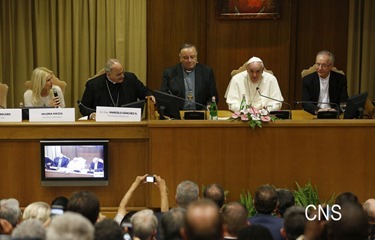
We are very happy that Mayor Marty Walsh of Boston was able to represent us at this gathering.
It is ironic that some people see faith as being in contrast to reason and science. Instead, throughout history, the Church has always been a leader in trying to promote scientific knowledge and discovery. This Vatican Academy continues in that same tradition, trying to promote science and ensure that scientific genius serves the common good and is not used for selfish or violent ends.
As we have commented before when the Holy Father’s encyclical Laudato Si’ came out, the Holy Father makes a very clear connection between the situation of the poor in the world and the fragility of the environment. The conference held this week in Rome reflects those themes that are so well delineated in that encyclical.
Within the Holy See, there is a very strong awareness that the population of the world is very quickly moving from rural areas into large metropolitan cities. There have been many conferences on the issue, including when I was invited to address in Milan on evangelizing the cities. So, we shouldn’t be surprised that the Holy See, particularly this type of Academy, would reach out to mayors of major cities to invite them to be part of this reflection on these themes.
– – –
Saturday, I went to Pittsburgh for the profession of four Capuchin novices.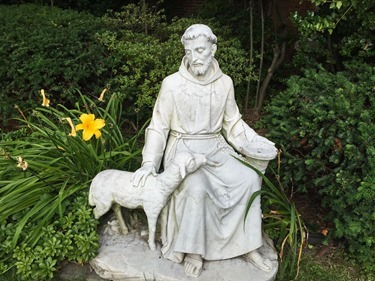
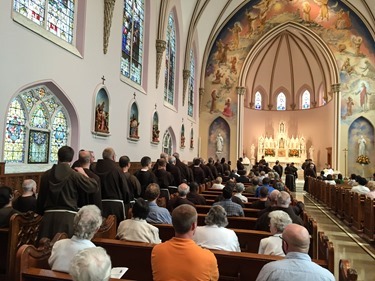
The profession was held in the motherhouse of the Sisters of St. Francis of Millvale. The motherhouse is very close to our provincial headquarters.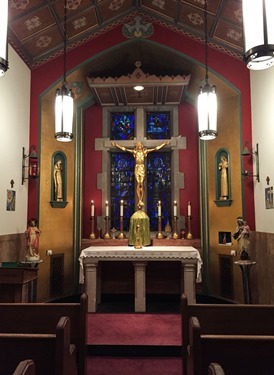
This is a community of sisters who were originally of German origin, so they had a very close connection with the Capuchins when we were running German parishes in the area.
These were also the sisters who worked in the missions with us. One of them was Sister Jane Schmidt, who worked with me in the Virgin Islands many years ago. She helped set the Third Order community on St. Croix and she is now living at the motherhouse.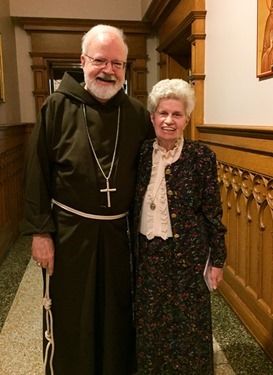
On a wall in the motherhouse is a map of all the mission countries where the sisters work.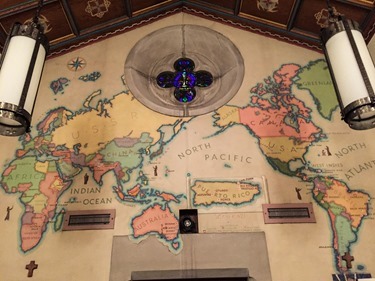
This is a picture of the newly professed with some of the other Friars. In the photo is Bishop Bill Fey, who is the Bishop of Kimbe in New Guinea, who was also there for the profession.
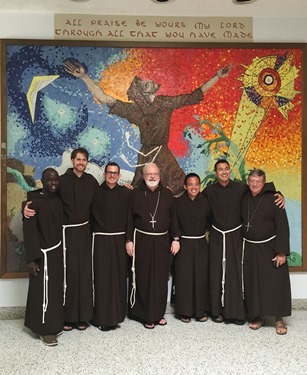
– – –
On Sunday, I went to Lowell for the closing Mass of the Steubenville East Catholic Youth Conference that was held at the Tsongas Center there. It was a wonderful event, attended by nearly 3000 young people.
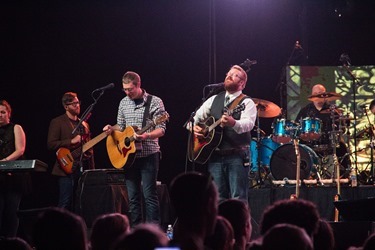
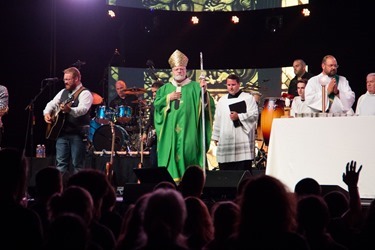

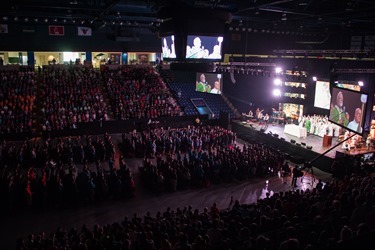 In my homily, I spoke to them about the gospel reading from Mark 6.
In my homily, I spoke to them about the gospel reading from Mark 6.
In the gospel reading for the previous Sunday, Jesus sends the apostles out two-by-two. This, I said, was Jesus’s training program for the apostles, the formation of leaders and that’s what I said Steubenville East is about. Then, in the gospel reading we had that day, we see those novice apostles coming back, all excited and sharing their experiences.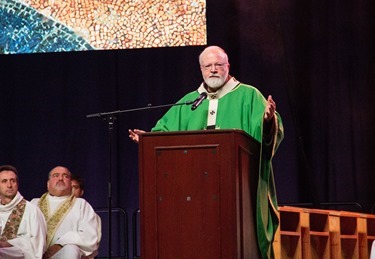
I said that the Sunday gospel of the apostles coming back shows the two modes of Christian life: one is gathering in a secret place with Jesus to be renewed and the other is being out “running the field hospital” and preaching the gospel. That pericope of the gospel is sandwiched between two banquet scenes. The first is Herod’s birthday party where they killed John the Baptist, which puts in context the sense of urgency — as well as the dangers and difficulties — of the ministry to which these twelve apostles are being sent out. They are taking up where John the Baptist is ending.
Then, after the passage of the Sunday gospel, is where Jesus performs the miracle of the loaves and the fishes. So I told the young people, we have to choose, do you want be part of Herod’s banquet or do you want to be part of Jesus’s banquet?
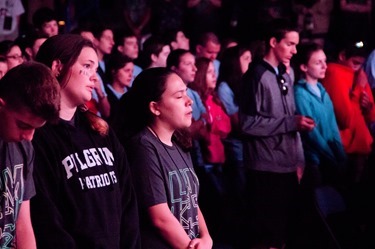
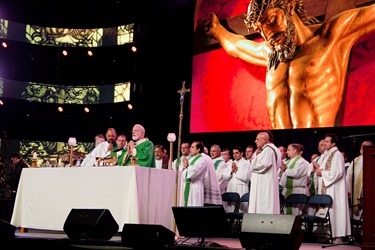
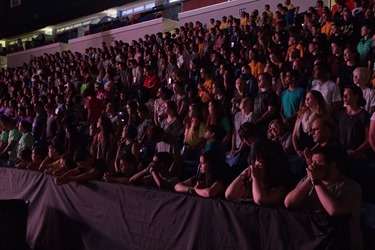
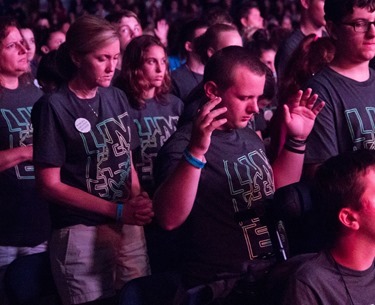
At the end, we had an altar call for those considering a vocation to priesthood or consecrated life. Before making the call, I spoke to them about having a sense of vocation, saying that their happiness and happiness of many other people, will depend on their making the right vocation decision. If you don’t have that sense of vocation, you can make the wrong choice and that will introduce chaos and sadness into your life.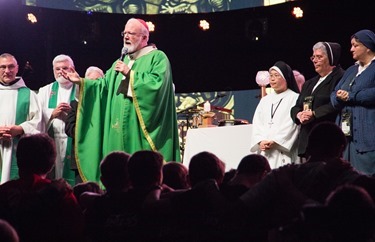
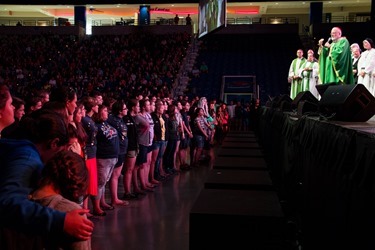
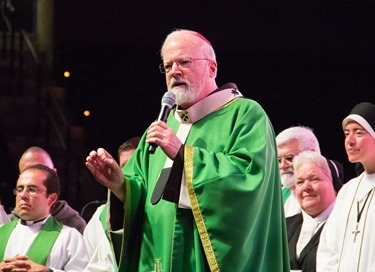
I mentioned the story of the rich young man who, when Jesus told him to leave everything he owns and follow him, went away sad. Hearing that story, you almost want to chase him down the street saying, “Come back, you dummy! Your decision is making you sad, but don’t you see it is also depriving all those people you would have affected had you followed your vocation?”
– – –
Having just had the gospel that morning about the apostles coming back two-by-two and telling Jesus their experience, later that day I had a living experience of much the same thing.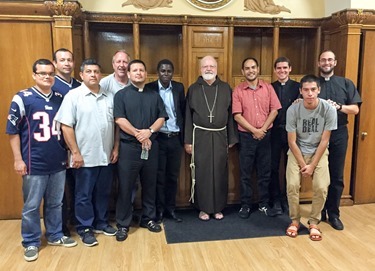
Over the previous ten days or so, following the example of the apostles in the gospel, 800 members of the Neocatechumenal Way had fanned out two-by-two throughout the United States to announce the Good News wherever they went. They came without money or possessions, just depending on upon God’s providence, as the gospel the previous Sunday had said.
Groups came to all four dioceses of Massachusetts and we had seven pairs of men visit the archdiocese of Boston. As their journey was coming to an end, I met with several of them at the Cathedral to hear how it went.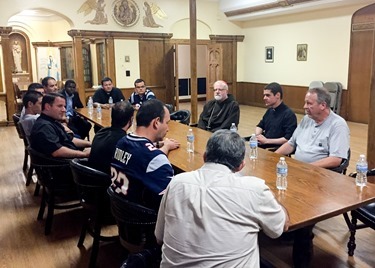
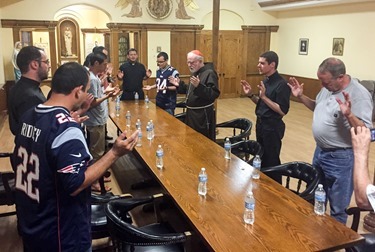
It was interesting to hear their experience, even in some cases an experience of homelessness and living with homeless people. I was impressed that some reported back how kind the homeless people were to them, and that there was a charity among the very poor they had not been aware of before.
Several of them were priests, but there were also several laymen one of whom was John Leonard, the brother of Dorothea Leonard, who was a very close and dear friend of mine.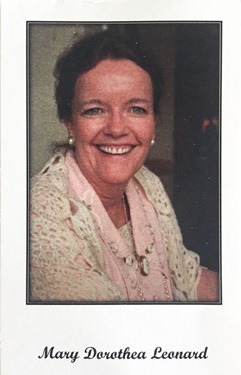 I taught her at university, she was involved in the Third Order of St. Francis and the Neocatechumenal way, and was a teacher in a Catholic school — just a very holy woman. Meeting her brother was a nice treat!
I taught her at university, she was involved in the Third Order of St. Francis and the Neocatechumenal way, and was a teacher in a Catholic school — just a very holy woman. Meeting her brother was a nice treat!
– – –
Finally, also this week I met with two young men sent by Archbishop Celestino Migliore, the nuncio in Poland, to visit us here to talk about World Youth Day preparations and some of the communication issues involved. They came for lunch and met with Father Matt Williams and myself.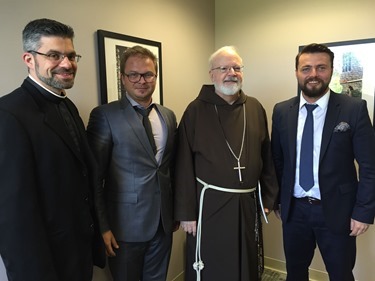
Until next week,
Cardinal Seán
